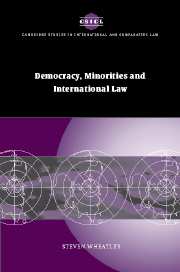Book contents
- Frontmatter
- Contents
- Acknowledgments
- Table of cases
- Table of treaties
- Table of UN resolutions and OSCE and other documents
- List of abbreviations
- Introduction
- 1 The rights of minorities
- 2 The self-determination of peoples
- 3 Democracy
- Conclusion: the accommodation of diversity
- Index
- CAMBRIDGE STUDIES IN INTERNATIONAL AND COMPARATIVE LAW
Introduction
Published online by Cambridge University Press: 27 October 2009
- Frontmatter
- Contents
- Acknowledgments
- Table of cases
- Table of treaties
- Table of UN resolutions and OSCE and other documents
- List of abbreviations
- Introduction
- 1 The rights of minorities
- 2 The self-determination of peoples
- 3 Democracy
- Conclusion: the accommodation of diversity
- Index
- CAMBRIDGE STUDIES IN INTERNATIONAL AND COMPARATIVE LAW
Summary
The period following the end of the Cold War has seen an ‘increasing clash of cultures’, most notoriously with the attacks on 11 September 2001 by Islamic terrorists on the twin towers of the World Trade Center in New York, the pre-eminent symbols of Western global capitalism. Immediately following the attacks, the United Nations Educational, Scientific and Cultural Organization (UNESCO) adopted a Universal Declaration on Cultural Diversity. The Declaration proclaims that the ‘defence of cultural diversity is an ethical imperative, [implying] a commitment to human rights and fundamental freedoms, in particular the rights of persons belonging to minorities and those of indigenous peoples’.
The purpose of this book is to examine the position of cultural minorities in international law, with a particular focus on democratic States. For the purposes of the work, the term ‘ethno-cultural’ will be applied to cultural groups, given the inter-generational aspect of group identity. Ethno-cultural groups are groups of persons, predominantly of common descent, who think of themselves as possessing a distinctive cultural identity, which may be based on a particular religion and/or language, and who evidence a desire to transmit their culture to succeeding generations. In this context, ‘culture’ is a synonym for identity. Cultural conflicts involve disputes (violent and other) between different identity groups. Cultural conflicts exist primarily between the State authorities and ethno-cultural minorities.
- Type
- Chapter
- Information
- Democracy, Minorities and International Law , pp. 1 - 6Publisher: Cambridge University PressPrint publication year: 2005

